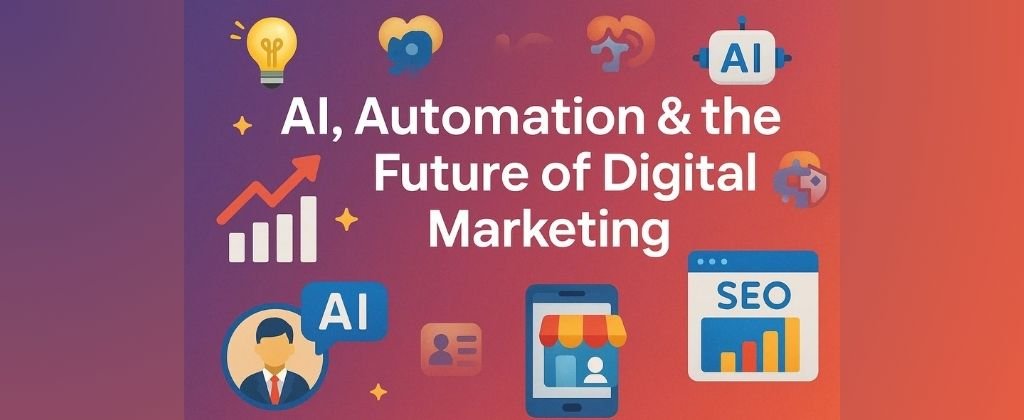In today’s fast-changing digital world, businesses are constantly searching for new ways to reach their audience more effectively and efficiently. The future of digital marketing is being reshaped by two powerful forces: AI (Artificial Intelligence) and Automation. These technologies are not only making marketing faster and smarter but also more personalized and cost-effective. In this blog, we’ll talk about how AI, Automation & the Future of Digital Marketing are connected and how AI & Automation for business is becoming a game-changer for growth and success.
How AI, Automation & the Future of Digital Marketing Are Connected
Digital marketing is no longer just about posting on social media or sending emails. It’s now about understanding your customer deeply, predicting their behaviour, and offering them exactly what they need at the right time. This is where AI and automation come into play.
AI refers to machines and software that can think, learn, and make decisions like humans. In marketing, AI can analyze big data, track user activity, and give marketers insights into what works and what doesn’t. Automation, on the other hand, is about using technology to perform tasks with little or no human effort. This includes scheduling social media posts, sending personalized emails, or even running entire advertising campaigns.
Together, AI and automation are helping businesses deliver better experiences to customers while saving time and money.
AI & Automation for Business: Changing the Marketing Game
Earlier, businesses used to rely on guesswork and manual strategies to run their marketing. But now, with AI and automation tools like chatbots, email automation, content generators, and customer segmentation tools, marketers can work smarter.
For example, when you visit a website and a chatbot greets you and answers your questions—that’s AI. When you get a special discount email on your birthday—that’s marketing automation. These small but powerful touches make customers feel valued and understood.
Let’s look at the different areas where AI and automation are transforming digital marketing:
📌 Personalized Marketing
With AI, businesses can collect and analyze data about customer interests, behaviour, and preferences. Based on this, they can show customized ads or recommend products that a customer is most likely to buy. Amazon and Netflix are the best examples of personalized marketing using AI.
📌 Chatbots for Instant Customer Support
Chatbots powered by AI are helping businesses provide 24×7 customer support. They can handle common questions, take orders, and even resolve complaints. This improves customer satisfaction and reduces the workload of support teams.
📌 Predictive Analytics
AI tools can predict future customer actions based on past data. This helps businesses make better decisions like when to launch a product, what price to set, or which marketing channel to use.
📌 Automated Email Marketing
Using automation, marketers can send targeted emails based on user behaviour. For example, if someone adds a product to their cart but doesn’t buy, an automated email can remind them to complete the purchase.
📌 Content Creation and Curation
AI tools like ChatGPT or Jasper can help create blog posts, social media captions, ad copies, and more. This saves time and ensures that businesses always have fresh content to share.
📌 Smart Advertising
AI can manage and optimize digital ads by tracking which ads perform best and automatically shifting the budget to them. This helps in getting the best return on investment (ROI).
Benefits of AI and Automation in Digital Marketing
The impact of AI and automation is huge. Let’s look at some of the major benefits:
- Saves Time: Automation tools do repetitive tasks, so marketers can focus on creative strategies.
- Improves Accuracy: AI reduces human errors in data analysis and decision-making.
- Enhances Customer Experience: With personalized messages and quick support, customers feel valued.
- Increases Efficiency: Campaigns run faster and reach the right audience.
- Cost-Effective: Saves money by reducing the need for large marketing teams.
Real-Life Examples of AI and Automation in Action
- Zomato: Uses AI to recommend dishes and restaurants based on user behaviour.
- Flipkart: Sends automated push notifications and emails with personalized offers.
- Swiggy Genie: Uses automation to track orders and inform users in real-time.
- Lenskart: Uses AI to let users try glasses virtually.
Challenges and Limitations
While AI and automation are powerful, they also come with some challenges:
- Data Privacy Concerns: Collecting too much customer data can raise privacy issues.
- Over-Reliance on Technology: Machines may fail or give incorrect suggestions sometimes.
- Lack of Human Touch: Some customers still prefer talking to real humans.
- High Setup Cost: Advanced AI tools can be expensive for small businesses.
But with proper planning and strategy, these challenges can be handled effectively.
Future of Digital Marketing with AI and Automation
The future looks very exciting. As AI becomes more advanced, we can expect:
- Voice Search Optimization: With people using Alexa and Google Assistant, voice-based marketing will grow.
- Visual Search: Users can search products using photos, and AI will find the match.
- Hyper-Personalization: Every customer will get unique experiences based on their behaviour.
- Marketing Without Marketers: AI will handle everything from content creation to customer engagement.
AI will not replace marketers but will empower them to work smarter, faster, and better. The key is to embrace these changes and keep learning new tools.
♟️ Final Thoughts
AI, Automation & the Future of Digital Marketing are not just buzzwords—they are the new reality of how businesses connect with customers. Whether it’s a small startup or a big brand, everyone is adopting AI & Automation for business growth.
If you want to succeed in digital marketing in the coming years, learning AI tools and automation platforms is no longer optional—it’s essential. From improving customer experience to increasing sales, the power of these technologies is unmatched.


Leave A Comment